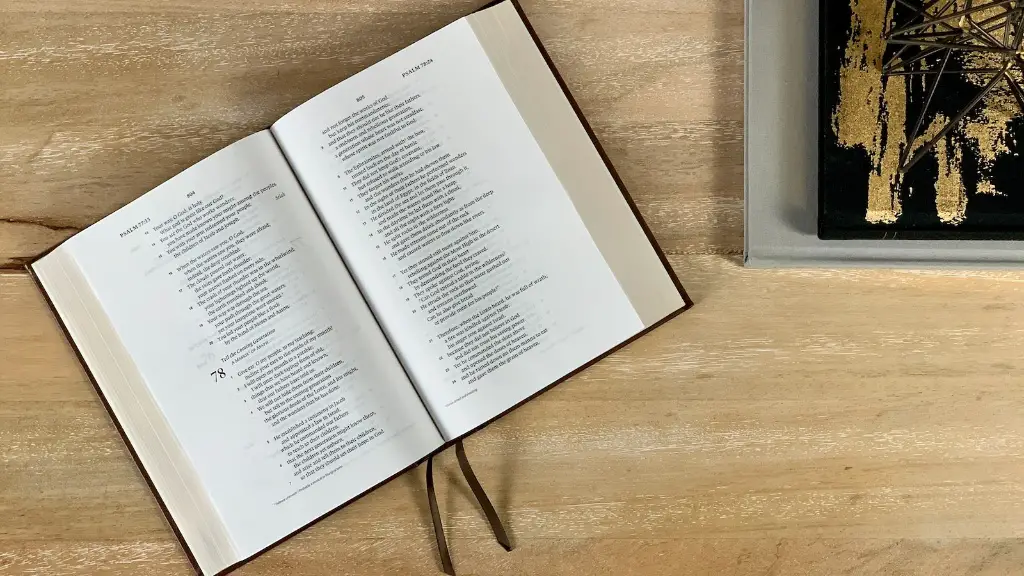What is Poetry in the Bible
Poetry is a significant form of literature in the Bible. It is found throughout both the Old and the New Testaments. Poetry is mainly found in the Psalms and in the lyrical sections of various other books, such as the Book of Job, Song of Songs and Ecclesiastes. In addition to being an important form of writing in the Bible, poetry has also been influential in the development of culture, especially in terms of its impact on faith, society and other forms of literature.
The Bible’s poetic content is based on the rhythms, word choices and styles of the Hebrew language. Over 100 Bible passages are composed in Hebrew poetic structures; these are known as parallelism, meter, and figures of speech. Examples of parallelism use phrases, sentences and ideas that are related, often repeating the same thought is different words. The use of meter in the Bible gives it a sound quality and rhyming patterns. Figures of speech, such as hyperbole and metaphors, are used to emphasize certain points.
Experts say that the poetry in the Bible is different from other poetry because it is uniquely divine. Biblical poetry is unconstrained by literary or artistic conventions. While Biblical poets use symbols and other artistic devices, the focus is always on conveying the divinely inspired message, rather than on aesthetics. This emphasis on conveying a divinely inspired message is what makes Biblical poetry particularly powerful and significant.
The power of Biblical poetry lies in its ability to communicate the message of the Bible in a more immediate and accessible way. Its beauty and precision can appropriate our emotions and even touch our souls. For example, the Psalms deeply explore our struggles, fears, joys and sorrows. Their intimacy is highly powerful as it speaks directly to our lives and our spiritual experiences.
Many experts have argued that the purpose of poetry in the Bible is not to entertain, but to instruct and encourage. Poetry can be used to teach us timeless truths and remind us of what is important. By showing us beauty and helping us to grow in faith, the poetry of the Bible can strengthen us to love God and love our neighbours.
In addition to being instructional, Biblical poetry is also believed to be unifying and comforting. As it focuses on universal themes, it is able to bridge gaps between cultures and ages. Its message of hope and peace encourages us to live in harmony and unity with one another, especially when we are facing trials and difficulties.
The Impact of Biblical Poetry on Society
Biblical poetry has had a significant and lasting impact on the world. It has been used to shape the culture and beliefs of many nations and faiths. It has also been used by authors, poets, educators and artists to get inspired, form their messages and reach larger audiences. The hymns and songs that were inspired by Biblical poetry are well-known across faiths and cultures.
The importance of Biblical poetry is also reflected in its lasting influence on literature and other art forms. Books, plays, movies and artworks that have been influenced by the Bible are still being made and enjoyed today. Through these works of art, Biblical poetry is able to continue to shape our culture and faith.
However, it is important to note that while Biblical poetry is still influential in the world today, it is still mainly a religious form of literature. It is mainly used in a religious context to teach spiritual truths and to inspire piety. This is why its importance lies in its ability to be used as a tool for conveying divine truths.
In contrast to the secular and often vapid forms of art in popular culture today, the power of Biblical poetry lies in its ability to confront us with the divine reality of our lives and to remind us of our purpose. Its ability to communicate profound truths through powerful images, common language and timeless metaphors is what makes it so powerful and enduring.
The Use of Poetry in Worship
The use of poetry in worship is very common in both Christianity and Judaism. In Christianity, it is often used to seek comfort and guidance from God, to praise Him and to serve as a form of meditation and contemplation. In Judaism, it is used as part of the prayer service and as a means of expressing emotion, reverence and devotion to God.
The use of poetry in worship serves two purposes. First, it is a way to express praise, adoration and love for God. This can be seen in the numerous psalms and hymns contained in the Bible. Second, it can be used to inspire and uplift people. This can be seen in the great prophets in the Bible, such as Isaiah and Jeremiah, who used poetry to make their messages more effective.
In addition to its use in worship services, Biblical poetry has also been used in other contexts, such as during sermons, lectures and sermons. This type of poetry is often used to illustrate spiritual truths or to communicate a message in a creative and powerful way. As it is able to capture the attention of listeners and keep them engrossed, it often serves as an effective tool for teaching, motivating and inspiring people.
The Place of Biblical Poetry in the Modern World
In today’s world, the power of Biblical poetry remains. Despite the fact that many people do not understand the Hebrew language and its poetic structures, its power to communicate timeless truths and to touch people’s hearts remains strong. It can still be seen in the hymns and songs that are still sung in churches and synagogues and in the artworks, plays and movies that are inspired by the Bible.
Biblical poetry is also still being used to instruct and encourage people, especially in spiritual and religious contexts. Its message of hope, faith and peace is still inspiring and impacting many lives around the world and its power continues to be felt.
As technology and communication evolve and new forms of literature emerge, the place of Biblical poetry in the modern world may change and adapt. However, its impact on centuries of faith, culture and art and its power to still touch people’s hearts will remain.
Religion and Poetry
Poetry is often used in religious contexts to capture the attention of believers and as a tool for conveying truths. Judaism and Christianity are not the only religions that use poetry for this purpose. In Islam, famous poets are considered to be men of profound wisdom and many of the Quranic revelations are written in poetic form. Similarly, in Hinduism, poetry is often used as a tool for understanding God, while in Buddhism and Taoism, it is used to illustrate ethical and spiritual truths.
The use of poetry in religious contexts is universal. It can be seen in the works of many famous religious figures, such as Moses, Jesus, Muhammad and Buddha, who all used poetry to convey their messages. It also provides a powerful tool for expressing faith, understanding religious truths and teaching moral lessons in creative and inspiring ways.
The Value of Poetic Literature
Poetry is an essential form of literature and an important tool for conveying spiritual truths and lessons. It is widely used in the Bible and other religious texts, as well as in many other forms of literature. It can also be seen in popular culture, such as songs, movies and artworks. Its power to stimulate emotion and convey timeless truths is what makes it such a cherished form of expression.
Although poetic forms vary from culture to culture, there is a common power that lies in its ability to influence, instruct and encourage. It has the ability to move people, to evoke emotion and to impart wisdom. And in a world so full of noise and distraction, it can help us to slow down, to pause and to appreciate the beauty and the poetry that is found in the world around us.





